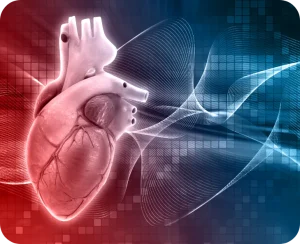Transcatheter Aortic Valve Implantation (TAVI)
What is TAVI?
Transcatheter aortic valve implantation (TAVI) is a minimally invasive procedure used to treat aortic valve stenosis—a condition where the aortic valve narrows and restricts blood flow from the heart to the rest of the body. TAVI involves replacing the damaged valve with a prosthetic valve, typically delivered via a catheter inserted through a small incision and guided to the heart.
Why do I need TAVI?
Aortic valve stenosis can lead to symptoms such as chest pain, shortness of breath, fatigue and fainting spells. If left untreated severe aortic stenosis can significantly impair heart function and increase the risk of heart failure and sudden cardiac death. TAVI is recommended for people with severe aortic stenosis who are deemed high or immediate risk for traditional open-heart surgery or who may not be suitable candidates for surgery due to age or other health conditions.


What can I expect from TAVI procedure?
During a TAVI procedure you will be given anaesthesia to ensure you are comfortable and pain-free throughout. A small incision will be made (usually in the groin or chest area) to access blood vessels. The surgeon will use a catheter to place the new artificial valve inside the diseased aortic valve.
Throughout the procedure your medical team will closely monitor your heart rhythm, blood pressure and other vital signs to ensure your safety and the success of the procedure. The entire procedure typically takes a few hours and most patients are able to return to their hospital room for recovery shortly afterward.
What can I expect during recovery from TAVI?
Recovery from TAVI varies from person to person but generally involves the following:
- Hospital stay: You will likely spend a few days in the hospital for observation and monitoring after the procedure. During this time your medical team will closely monitor your condition, manage any discomfort or pain and provide guidance on post-procedure.
- Activity restrictions: While recovering you may be advised to avoid strenuous activities and heavy lifting for a period of time to allow your body to heal properly. Your healthcare team will provide specific instructions based on your individual needs and condition.
- Medications: You may be prescribed medications to prevent blood clots, reduce the risk of infection and manage any discomfort or pain during the recovery period. It’s essential to take these medications as directed by your healthcare provider.
- Follow-up care: After being discharged from the hospital you will need to attend follow-up appointments with your healthcare provider to monitor your progress, assess the function of the new valve and address any concerns or complications that may arise.

Are there any risks or complications?
While TAVI is generally considered safe and effective, like any medical procedure it carries certain risks and potential complications including:
Contact a cardiologist
If you’re experiencing symptoms of aortic valve stenosis, such as chest pain, fatigue, shortness of breath, fainting or heart palpitations contact Cardiology Specialists Melbourne for a consultation.
